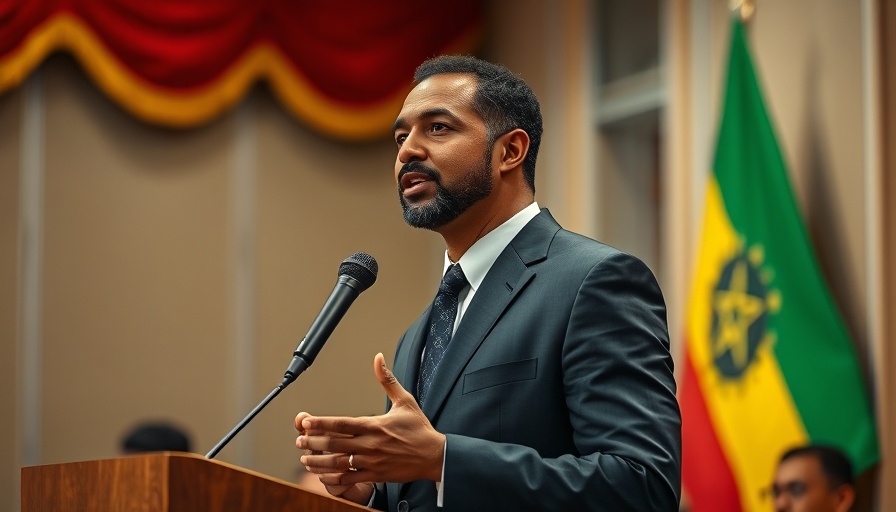
Understanding Recent Tensions: The Ethiopia-Eritrea Context
In a recent announcement, Ethiopian Prime Minister Abiy Ahmed asserted that his government would prioritize peaceful dialogue over military confrontation regarding Eritrea's access to the Red Sea. This statement comes amidst growing fears of conflict, amplified by Ethiopia's troop movements along the border and Eritrea's nationwide military mobilization. Political analysts and regional experts have voiced concerns that renewed hostilities could undermine previous reconciliatory efforts, which culminated in Abiy’s Nobel Peace Prize awarded in 2019.
In Ethiopia: Abiy Ahmed dismisses war possibility with Eritrea amid rising fears, the discussion dives into potential military conflicts, raising critical insights that sparked deeper analysis on our end.
Avoiding War: Abiy’s Bold Stance
Abiy Ahmed's commitment to dialogue rather than escalation highlights a strategic approach aimed at safeguarding the fragile peace established between Ethiopia and Eritrea after years of conflict. It reflects an understanding of the historical complexities that include territorial disputes and economic hardship, especially given Ethiopia's landlocked status. The Prime Minister’s insistence on communication underscores a vital truth: confrontation rarely resolves issues effectively, and diplomatic channels remain the best avenue toward sustainable solutions.
The Humanitarian Implications of Conflict in the Horn of Africa
Another critical aspect of this situation lies in the potential humanitarian crisis that could arise from conflict between Ethiopia and Eritrea. The Horn of Africa is already grappling with severe crises, including the unrest in Sudan and the dire impacts of climate change affecting food security across the region. A military escalation could lead to further displacement and exacerbate already strained resources, making proactive measures all the more essential.
Political Dynamics: Regional and International Considerations
The political dynamics between Ethiopia and Eritrea have far-reaching implications that resonate beyond their borders. Regional stability in East Africa hinges on this relationship, influencing diplomatic ties and economic cooperation across various nations. The African Union, notably, has played a pivotal mediating role, working to foster dialogue among the member states. Abiy’s current stance illustrates a nuanced understanding of these dynamics, as he takes into account the broader implications of any potential military engagement.
Lessons from History: The Need for Diplomatic Engagement
The recent tensions provocatively remind us of the turbulent past shared by Ethiopia and Eritrea. The Ethiopia-Eritrea War from 1998-2000 resulted in significant loss of life and suffering, exemplifying how miscalculations in diplomacy can have catastrophic consequences. This historical context emphasizes the value of prevention over remedy; fostering engagement through dialogue can avert the tragic repeats of history.
Future Trends: What Lies Ahead for Ethiopia and Eritrea?
Looking forward, the importance of strategic diplomatic initiatives cannot be overstated. Abiy Ahmed's emphasis on peaceful resolutions may pave the way for a new age of cooperation in a region plagued by historical animosities. Building on existing recoveries from previous conflicts could lead to enhanced trade routes and improved economic relationships that benefit not only Ethiopia and Eritrea but the entire Horn of Africa. As engagement progresses, observers will need to monitor government actions and rhetoric closely to see if they reflect a genuine commitment to peace.
Final Thoughts: The Path to Peace is Paved with Dialogue
In summary, the situation between Ethiopia and Eritrea is one laden with complexity but teeming with opportunity for reconciliation. As Abiy Ahmed steps forward with a commitment to dialogue, both nations can take lessons from their tumultuous history, aiming for future cooperation. For those interested in African news and politics, the emergence of a peaceful resolution here could serve as a vital case study in conflict resolution and regional cooperation, making Ethiopia’s current political climate particularly compelling to follow.
 Add Row
Add Row  Add
Add 




Write A Comment